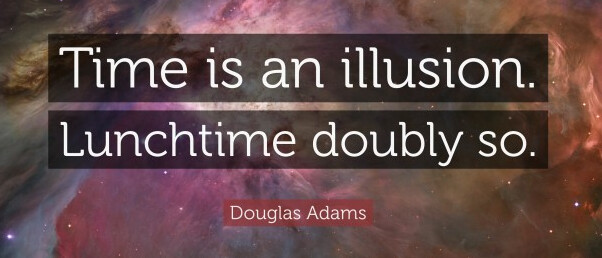I could buy that “time” as we experience it could be an emergent property, like “temperature,” that doesn’t mean anything to individual particles
I’m not enough of a physicist to have an opinion on the supposed details though
Time is a concept created to measure the periods (edit) between the movements of the sun and the moon (end edit) so people would be stop being late for appointments (it obv. didn’t work). Then the clockmakers and the scientists (or the other way around?) took over.
Howzat? 
This may all just be a dodge on whether causality can be affected by quantum random thingy. I suspect that’s it’s a teacup murder mystery that won’t matter much in the future that uses the math.
I’m more interested in the dark-matter/dark-energy ends of things.
I’ve often thought that the fundamental factor is change, rather than time. Thus instead of speed being distance/time, time = distance/speed, speed is the fundamental physical entity, while time is derived (and so doesn’t really exist). And so on for other types of change.

The only way for me to make sense of relativity is that speed is more useful as an orthogonal vector to the (mathematical) curvature field of space time in describing what is going on, rather than trying to supercede the two mind-bending theories with a Greater Theory when they are most likely complementary anyway.
*numerous edits to my giant run-on sentence
Best I can say, is borrow the book from your local public library.
Sure, he’s on youtube, but his English speaking voice isn’t wonderful, and his Loop Quantum Gravity papers are mathematically dense.
Time exists, for humans anyway, and I therefore find it important.
I sometimes find it binary. There is ‘now’ and ‘not-now’, but ‘not-now’ doesn’t really exist now. There may be memories and written records we call the past, but that past doesn’t currently exist. There may be plans and due dates we call the future, but that stuff doesn’t currently exist either.
The past was once now, and the future someday will be now, but neither would be anything if they were never ‘now’. So there is only ‘now’ and ‘not-now’. And we live in ‘now’, so it is the only true time.

OR DID IT 
So, a dodge.
Nah, it’s accessible somewhere in Oz’traya; it goes counter-clockwise, like the water in the flushing toilets there! 
… a Fiat Chrysler company now part of Stellantis?
Thanks for the recommendation. The book is fabulous. And finally, a scientist who writes almost poetically without the style getting the in way of the science. Generally I like just a really clear explanation without any literary shenanigans at all, but this was an exception. Quite readable, and I learned a lot.
The researchers looked at the genetics of behavior in two different ways. One was to look at the answers to the individual survey questions and determine if they were associated with any genetic variants. This method had the amusing result that the individual behavior with the strongest genetic association was “gets stuck behind objects,” which they narrowed down to a small region that contains a gene associated with cognitive capacity in humans. Howling ended up in a region near a gene involved in human language.
They also clustered the survey questions into groups representing general behavioral tendencies, like the willingness and capacity to follow human instructions, sociability toward other dogs, and desire for human contact. Many of these had a significant genetic component, responsible for 25 percent or more of the differences in behavior for human sociability, toy-directed behavior, and ability and interest to respond to commands. But the effects were generally pretty weak, with mutts only showing about 9 percent of their behavioral tendencies that could be explained by genetic factors.
“Bigger”? Wtf kind of phrenology is that shit?
Yeah, they didn’t mention surface folding and area as factors in intelligence.
